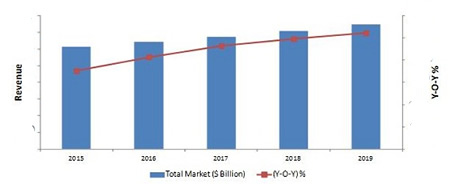The report “Intelligent Building Automation Technologies Market System & Services [Physical Security, Life Safety, Facility Management]; IT Technologies; Industry Verticals – Global Advancements, Worldwide Forecast & Analysis (2014-2019)” defines and segments the IBAS market into various sub-segments with an in-depth analysis and forecasting of revenues. The report also identifies the factors driving this market, various restraints and opportunities impacting it, along with the technology roadmap and adoption trends.

MarketsandMarkets broadly segments the intelligent Building Automation Technologies market into four categories, namely facilities management systems, life security, physical security systems, and information technology. The physical security systems are segmented as access control, car park management systems, CCTV/video surveillance, explosive detectors, screening solutions, and others. Life security systems are segmented into emergency response, fire security, and others. The facilities management systems are segmented into elevator control, energy management systems, Heating, Ventilation, and Air Conditioning (HVAC), lighting management systems, and others. The information technology segment is divided into computing hardware, computing software, computing and network services, and network equipment. The market segmentation by geography is as follows: North America (NA), Europe, Asia-Pacific (APAC), Middle East and Africa (MEA), and Latin America (LA).
The major driving factors for the Intelligent Building Automation Technologies market are efforts to reduce CO2 emissions, enhanced safety and security in intelligent buildings, IBAS acting as a differentiator for real estate developers, sizeable reduction in operating costs, and incentives provided by government. Challenges faced in the Intelligent Building Automation Technologies market are lack of education and promotion among end users and the barriers of high initial investment and unproven technologies. Today’s high-rise buildings are technologically equipped and consume a lot of energy; thus, enterprises are always looking for solutions to reduce their CO2 emissions along with reducing their overall energy consumption and lowering their operational costs at the same time.
MarketsandMarkets forecasts the intelligent Building Automation Technologies market to grow from $58.9 billion in 2014 to $74.8 billion by 2019. In terms of regions, North America and Europe are expected to be the biggest markets in terms of revenue contribution, while Asia-Pacific, Middle East and Africa, and Latin America are expected to experience increased market traction, during the forecast period.













